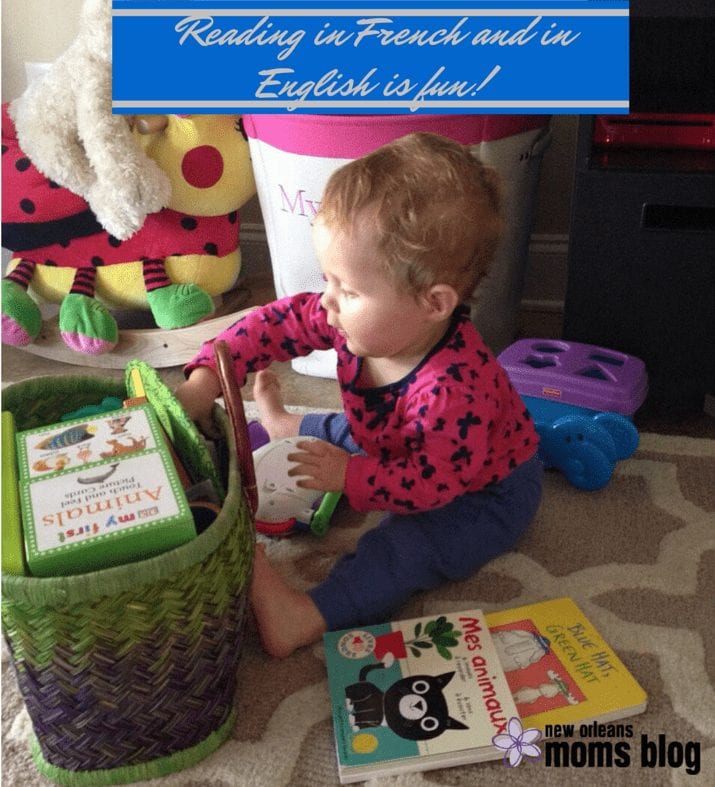Happy Monday! Bonjour!
This is more of a personal post that I wanted to share with you as the school year is starting, especially if you are a parent sending your child to an immersion school and still wondering how your child will succeed speaking in two languages.
I always knew I wanted to raise my children bilingual. I consider the ability to speak one’s language as a true gift, not only to understand people from other countries, but also as a key to better travel and global awareness. I did not always know I would live in another country myself, and being French with an American husband, it seemed that French and English would be both spoken equally in our home.
When I became pregnant with my first child over two years ago, the avid reader that I am stocked up on a variety of books about bilingualism. With my mini-library and my immersion teaching experience, I came to understand that I needed to do two things: speak only French to my daughter, even in front of strangers, and expose her to other people speaking French so she would get used to hearing various accents. Not so hard, right? I speak French, and so does my entire family. I spoke in French all day while teaching at a local immersion school, and I could easily spend the day without uttering one English word. I could certainly speak in French to my own child!
Well, it’s just not that simple.
First, speaking in French to your child and in English to your husband and your dog (not sure why English to the dog – don’t ask) … is just exhausting. It like doing constant gymnastics of the brain, and it has taken me months to activate the switch between English and French and to ensure that my sentences are correct in both languages. Then, how weird is it to tell the cashier’s at the grocery store “good morning,” and then turn to your child and say “dis bonjour à la dame?”
Now, let’s talk about printed materials. Books, toys, and anything printed is in … English. I know that it makes sense because we live in an English-speaking country, but I hadn’t given it much thought at first. If you plan on raising your child bilingual, be prepared to stock up well before your child is born or can read, because it takes a lot of organization and serious searching skills, and it can take a lot of money to have these materials shipped over. Luckily, my family can mail me puzzles and books, but still, all our electronic toys speak in English to my daughter, and I’m curious to comprehend how her brain is processing all that information. I have seriously wondered if I was not messing with her language acquisition more than helping her develop fine language skills.
Thankfully, my family and I have been most welcome to speak in French, not only by my in-laws, but also by our overall community. At the post office, we are greeted by a “bonjour,” and people we meet often congratulate my daughter for speaking French. I feel very lucky and encouraged to teach her French, and I do not feel embarrassed at all about speaking another language in public. On the contrary! People say “au revoir” when we leave and seem happy to reminisce on their own language skills. This unexpected support has given me the strength and pride to continue speaking French to her.
The coolest thing of all? It works!
My 21-month-old now comprehends me in French and her “papa” in English. She responds both in French and in English. She gets it! She is obsessed with fruit, especially apples (even oranges are apples in our family) and has chosen to say apple for all round fruit that she sees, but she says “arbre” for tree and “balle” for ball for instance. She says “bye-bye” when I ask her in French to say “au revoir.” Somehow, her brain can process both languages simultaneously. She responds to commands when prompted in French or in English. It’s fascinating to observe, and I couldn’t be prouder of her.
So, if you are the parent of a bilingual child, I commend you. For your willingness and the energy you are spending teaching your children how to express themselves in another language because it’s not that easy. There are various immersion schools around New Orleans, and most families who send their children there do not speak any of the language taught in class. Kudos to you for believing in the magic of immersion. It takes time, lots of hard work, and a seriously open mind, but it works. I promise. It’s really like magic. When my daughter finally says “pomme” when pointing to that apple, I can tell you I will have tears in my eyes. There’s a long way to go, and I need to be open enough to accept that English will certainly be her dominant language, but I am immensely proud for giving her the gift of a lifetime: communication in two languages.
















